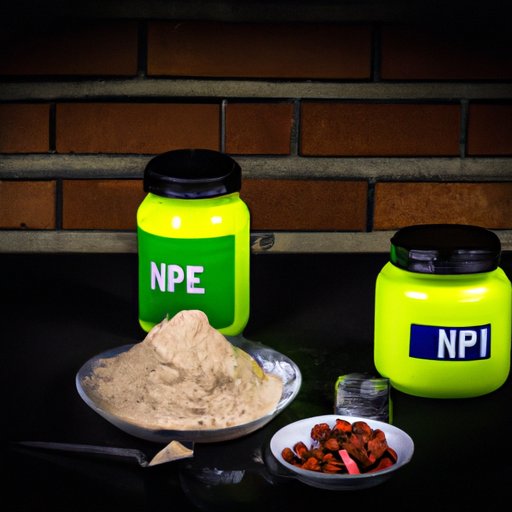Introduction
When it comes to working out, it’s not just about the exercise itself. What you eat before and after your workout can have a significant impact on your performance and results. Eating the right foods can help you fuel your workouts and maximize your gains, while eating the wrong foods can lead to fatigue and poor performance. In this article, we’ll explore what to eat before and after a workout, and the benefits of eating for optimal performance.
Pre-Workout Nutrition: What to Eat Before Exercise
Before you hit the gym, it’s important to fuel your body with the right nutrients. Eating a balanced meal 1-2 hours before your workout will give you the energy you need to power through your workout. It’s best to focus on complex carbohydrates, lean proteins, and healthy fats. These will provide your body with the sustained energy it needs for your workout.
Types of Foods to Eat
Complex carbohydrates are an essential part of any pre-workout meal. They provide the body with long-lasting energy, which is key for endurance exercises like running or cycling. Examples of complex carbohydrates include whole grains, oats, sweet potatoes, quinoa, and legumes.
Protein is also important to consume before a workout, as it helps build muscle and provides your body with the necessary amino acids to repair muscles after a workout. Lean sources of protein such as chicken, fish, eggs, and Greek yogurt are all great options. Healthy fats are also beneficial, as they provide your body with energy and help absorb certain vitamins and minerals. Sources of healthy fats include avocados, nuts, seeds, and olive oil.
Examples of Pre-Workout Meals
A pre-workout meal should be low in fat and fiber and easy to digest. Here are some examples of pre-workout meals that meet these criteria:
- Oatmeal with banana and almond butter
- Whole wheat toast with peanut butter and honey
- Greek yogurt with berries and almonds
- Turkey sandwich on whole wheat bread
- Smoothie with banana, almond milk, and protein powder
Post-Workout Snacks: What to Eat After a Workout
After a workout, it’s important to refuel your body with the right nutrients so that it can recover and repair itself. Eating a balanced meal within 45 minutes of finishing your workout can help your body rehydrate, replenish its glycogen stores, and repair muscle tissue. The goal is to provide your body with the necessary nutrients to rebuild and recover.
Types of Foods to Eat
Carbohydrates are essential for post-workout recovery, as they replenish the body’s glycogen stores and help the muscles recover. Complex carbohydrates such as brown rice, sweet potatoes, quinoa, and oats are all good options. Protein is also important after a workout, as it helps build muscle and aids in muscle recovery. Lean sources of protein such as chicken, fish, eggs, and Greek yogurt are all great post-workout snacks.
It’s also important to get enough electrolytes, as they help the body stay hydrated and reduce muscle soreness. Good sources of electrolytes include coconut water, bananas, oranges, and spinach. Lastly, healthy fats are important after a workout, as they provide your body with energy and help absorb certain vitamins and minerals. Sources of healthy fats include avocados, nuts, seeds, and olive oil.
Examples of Post-Workout Snacks
Here are some examples of post-workout snacks that meet these criteria:
- Hummus and veggies with brown rice
- Grilled chicken and sweet potato
- Egg omelet with spinach and tomatoes
- Greek yogurt with berries and almonds
- Smoothie with banana, almond milk, and protein powder
The Best Foods to Eat Before and After a Workout
When it comes to pre- and post-workout nutrition, it’s important to focus on nutrient-dense foods that provide your body with the necessary macronutrients and micronutrients. Macronutrients include carbohydrates, proteins, and fats, which provide your body with energy. Micronutrients include vitamins and minerals, which help your body function optimally and support muscle recovery.
Some of the best nutrient-dense foods to eat before and after a workout include lean proteins such as chicken, fish, eggs, and Greek yogurt; complex carbohydrates such as oats, quinoa, sweet potatoes, and legumes; and healthy fats such as avocados, nuts, seeds, and olive oil. Additionally, it’s important to get enough electrolytes, which can be found in coconut water, bananas, oranges, and spinach.

Fueling Your Workouts: What to Eat Before and After Exercise
In addition to focusing on nutrient-dense foods, it’s also important to consider the timing and portion size of your pre- and post-workout meals. Eating too much or too little can negatively affect your performance and results. Eating a balanced meal 1-2 hours before your workout will give you the energy you need to power through your workout, while eating a balanced meal within 45 minutes of finishing your workout can help your body recover and repair itself.
When it comes to portion size, it’s best to start small and work your way up. Eating too much food can lead to nausea and cramping during your workout, while eating too little can lead to fatigue. A good rule of thumb is to aim for a smaller portion size for pre-workout meals and a slightly larger portion size for post-workout meals.
Conclusion
Eating before and after a workout is essential for optimal performance and results. Pre-workout meals should focus on complex carbohydrates, lean proteins, and healthy fats, while post-workout meals should focus on complex carbohydrates, lean proteins, and electrolytes. Additionally, it’s important to pay attention to timing and portion sizes. For more information on pre- and post-workout nutrition, consult a registered dietitian or sports nutritionist.
(Note: Is this article not meeting your expectations? Do you have knowledge or insights to share? Unlock new opportunities and expand your reach by joining our authors team. Click Registration to join us and share your expertise with our readers.)
